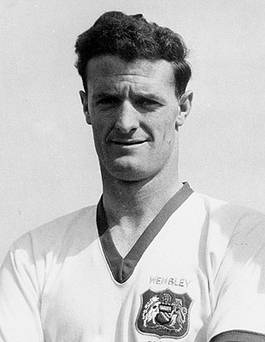
William Augustine Whelan, known as Billy Whelan or Liam Whelan, was an Irish footballer who played as an inside-forward. He died at the age of 22, as one of eight Manchester United players who were killed in the Munich air disaster.
James McIlroy was a Northern Ireland international footballer, who played for Glentoran, Burnley, Stoke City and Oldham Athletic. He was regarded as one of Burnley's greatest players, having played 497 matches and scoring 131 goals. McIlroy also managed Oldham Athletic and Bolton Wanderers.

John Blanchflower was a footballer from Northern Ireland. He graduated from Manchester United's youth system and played for the club on 117 occasions, winning one league title, before his career was cut short due to injuries sustained in the Munich air disaster. He was also capped 12 times at senior level by Northern Ireland.

Raymond Ernest Wood was an English professional footballer who played as a goalkeeper. Representing Manchester United, he played in the 1956 and 1957 Football League championship-winning teams.

Anthony Hateley was an English professional footballer who played as a centre forward. He scored 249 goals from 499 appearances in the Football League, and played First Division football for Aston Villa, Chelsea, Liverpool and Coventry City. In the lower divisions, he scored 109 goals from 188 league matches in two spells with Notts County, and also played for Birmingham City and Oldham Athletic. He was the father of England international footballer Mark Hateley and grandfather of footballer Tom Hateley.
Michael Trebilcock is an English retired professional footballer. He played primarily as a winger and is most famous for scoring twice in the 1966 FA Cup Final for Everton, becoming the first black player to score in an FA Cup Final. Trebilcock is described as a "black mixed heritage player" by sociologist Mark Christian, who notes that the label of first black Everton player is often wrongly given to Cliff Marshall, "due to [Trebilcock's] ambiguous black mixed heritage". Players of mixed heritage are now widely regarded as 'Black' e.g. Walter Tull and Trebilcock was acknowledged as Everton's first Black player by authors Bill Hern and David Gleave in their book Football's Black Pioneers - The Stories of the First Black Players to Represent the 92 League Clubs.
Andrew Lorimar Lochhead was a Scottish professional footballer who played as a forward.

Alfred McMichael was a footballer who played as a left back.
Robert Carmichael Mitchell, nicknamed "Bobby Dazzler", was a Scottish footballer who played as an outside left.
Stanley Lynn was an English professional footballer who played as a right back. He made nearly 450 appearances in the Football League for Accrington Stanley, Aston Villa and Birmingham City. Nicknamed "Stan the Wham", he was renowned for his powerful right-footed shots which came from his "Booming Boots".

David Nigel Sims was an English footballer who played as a goalkeeper in the Football League for Wolverhampton Wanderers, Aston Villa and Peterborough United in the 1950s and 1960s.
David Wedderburn Gibson is a Scottish former footballer, who played for Livingston United, Hibernian, Leicester City, Aston Villa, Exeter City and the Scotland national team.
Peter Aldis was an English professional footballer who played at full-back and appeared in 294 games for Aston Villa in league and cup.

Patrick Saward was an Irish professional footballer in the English football League and for the Republic of Ireland.

John "Jackie" Sewell was an England International footballer. He played as a forward for several teams including Sheffield Wednesday, Notts County and Aston Villa. When he was transferred to Sheffield Wednesday from Notts County, for £34,500, he was the most expensive signing in English football. When Sewell captained the newly independent nation of Zambia in October 1964, he became one of the few footballers who have played for two different countries. He was the last living footballer who played in the Match of the Century on 25 November 1953.
James Robert Dugdale was an English professional footballer best known for his career with Aston Villa, with whom he won a FA Cup winner's medal in 1957, 2nd Division Championship 1960, Inaugural League Cup Winner 1961. His playing position was Centre-Half.
Henry "Harry" Burrows is an English former professional footballer who played in the Football League for Aston Villa, Plymouth Argyle and Stoke City.

Michael McGrath is an Irish former professional footballer who played as a left half.
Bill Myerscough was an English professional footballer who played in the Football League for six clubs. He was in the Aston Villa side that won the 1957 FA Cup Final.
Leslie Joseph Smith was an English footballer who represented both Wolverhampton Wanderers and Aston Villa.








